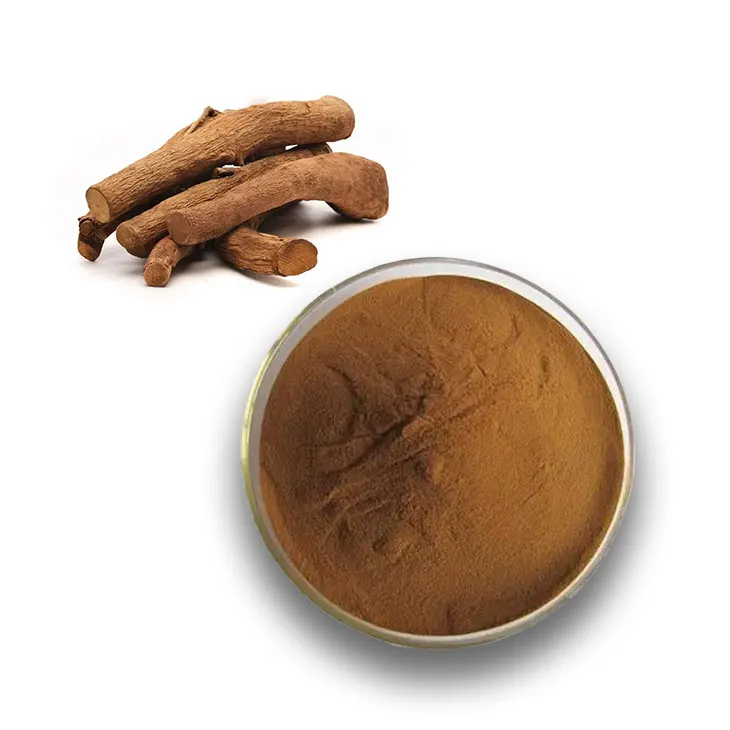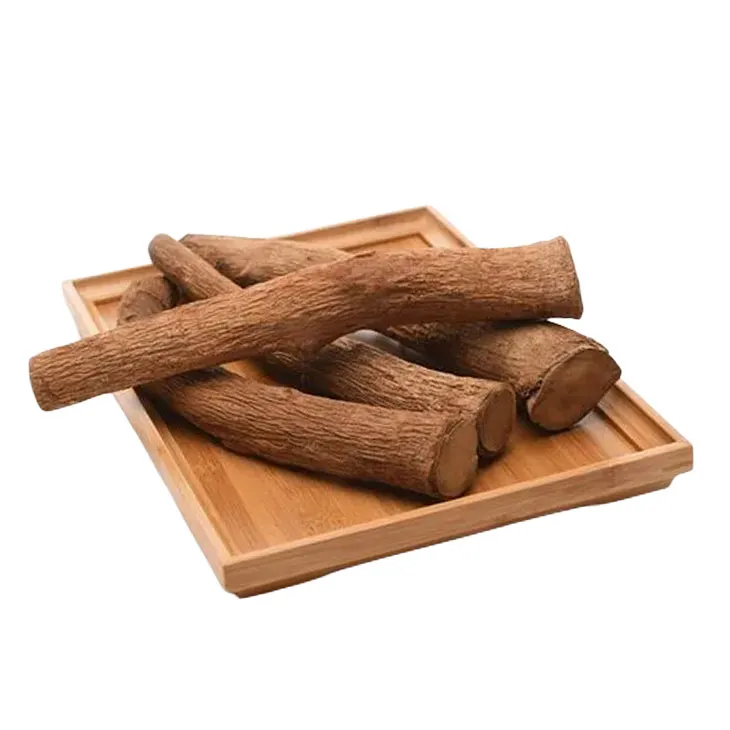- 0086-571-85302990
- sales@greenskybio.com
Use Tongkat Ali extract? Make sure you source from sustainable suppliers!
2024-12-13

Introduction
In recent years, the popularity of Eurycoma longifolia (Tongkat Ali) extract has been on the rise. This natural extract has attracted a great deal of attention for its potential health benefits, such as enhancing male vitality, improving energy levels, and having antioxidant properties. However, as the demand for Tongkat Ali Extract grows, it is crucial to ensure that it is sourced from sustainable suppliers. This article will explore in depth the reasons why sustainable sourcing is of utmost importance when it comes to Tongkat Ali Extract.

The Importance of Protecting Natural Habitats
Sustainable sourcing helps protect the natural habitats where Tongkat Ali grows. Tongkat Ali is native to the tropical rainforests of Southeast Asia, particularly in countries like Malaysia, Indonesia, and Thailand. These rainforests are complex and fragile ecosystems that are home to a vast array of plant and animal species.
- Unregulated harvesting can lead to deforestation. If Tongkat Ali is harvested without proper management, large areas of the forest may be cleared to make way for easier access to the plants. This not only destroys the habitats of Tongkat Ali but also affects other species that rely on the forest for survival. For example, many birds, insects, and small mammals depend on the trees and undergrowth in the rainforest for shelter, food, and breeding grounds. When the forest is cut down, these species may lose their homes and sources of food, leading to a decline in their populations.
- It also causes the destruction of ecosystems. The rainforest ecosystem is a delicate balance of living organisms and their environment. Tongkat Ali plays a role in this ecosystem, and its over - harvesting can disrupt the natural balance. For instance, the roots of Tongkat Ali may interact with other plants and soil organisms in ways that are not fully understood. Removing too many Tongkat Ali plants can affect the nutrient cycling in the soil, which in turn can impact the growth of other plants in the area. This can set off a chain reaction, leading to changes in the entire ecosystem structure.

Ensuring Long - Term Availability
Secondly, sustainable sourcing guarantees the long - term availability of this valuable plant. Tongkat Ali is a slow - growing plant, and it takes time for it to reach maturity and develop the properties that make its extract so desirable.
- With sustainable practices, we can ensure that future generations can also benefit from its potential health and other properties. If we deplete the Tongkat Ali population through unsustainable harvesting methods now, there may not be enough of the plant left for future research and use. For example, new medical discoveries may be made in the future regarding the plant's potential in treating certain diseases or improving human health in ways that we are not yet aware of. By ensuring its long - term availability through sustainable sourcing, we are leaving the door open for these future possibilities.
- It also helps in maintaining the economic viability of the Tongkat Ali industry in the long run. For local communities that rely on Tongkat Ali for income, sustainable harvesting ensures that there will always be a supply to sell. This can lead to stable economic development in these areas. If the plant is over - harvested and becomes scarce, the local economy that depends on it may collapse, and those who rely on it for their livelihoods will suffer.

Quality and Safety Assurance
Thirdly, ethical suppliers are more likely to adhere to proper extraction methods, ensuring the quality and safety of the extract.
- Proper extraction methods are crucial for maintaining the integrity of the Tongkat Ali Extract. Ethical suppliers will follow strict guidelines to ensure that the extraction process does not damage the active compounds in the plant. For example, they may use gentle extraction techniques that preserve the bioactive substances, such as alkaloids and quassinoids, which are believed to be responsible for many of the plant's health benefits. If improper extraction methods are used, such as using harsh chemicals or over - processing, these active compounds may be destroyed or altered, reducing the effectiveness of the extract.
- Quality control is also an important aspect of sustainable sourcing. Ethical suppliers will conduct regular quality tests on their Tongkat Ali extract. This includes testing for purity, potency, and the absence of contaminants. For instance, they will check for the presence of heavy metals, pesticides, or other harmful substances that may have entered the plant through environmental pollution or improper farming practices. By ensuring high - quality control, consumers can be confident that the Tongkat Ali extract they are using is safe and effective.
How to Identify Sustainable Suppliers
Given the importance of sourcing Tongkat Ali extract from sustainable suppliers, it is essential to know how to identify them.
- Look for certifications. There are several certifications that indicate sustainable sourcing practices. For example, some suppliers may have certifications from international organizations that verify their compliance with environmental and social standards. These certifications may cover aspects such as sustainable forest management, fair trade practices, and ethical labor conditions. One such certification could be the Forest Stewardship Council (FSC) certification, which ensures that the products are sourced from well - managed forests.
- Research the supplier's reputation. Check online reviews, industry forums, and consumer feedback to get an idea of the supplier's track record. A supplier with a good reputation is more likely to be committed to sustainable practices. You can also look for awards or recognition that the supplier has received for their sustainable efforts. For example, if a supplier has been commended for their environmental protection initiatives or their contributions to local communities, it is a positive sign.
- Ask about their sourcing and extraction processes. A sustainable supplier should be transparent about where they source their Tongkat Ali from and how they extract the extract. They should be able to provide detailed information about their harvesting methods, whether they follow sustainable harvesting limits, and what kind of extraction techniques they use. If a supplier is evasive or unable to answer these questions clearly, it may be a red flag.
The Role of Consumers in Promoting Sustainable Sourcing
Consumers also play a significant role in promoting sustainable sourcing of Tongkat Ali extract.
- Educate themselves about sustainable sourcing. By understanding the importance of sustainable sourcing, consumers can make more informed purchasing decisions. They can learn about the environmental and social impacts of Tongkat Ali extraction and how to identify sustainable products. This knowledge can be gained through reading articles, watching documentaries, or participating in educational campaigns related to sustainable products.
- Choose sustainable products. When consumers are faced with different options of Tongkat Ali extract in the market, they should opt for those that are sourced from sustainable suppliers. This sends a clear message to the market that there is a demand for sustainable products. As more consumers choose sustainable Tongkat Ali extract, it will encourage more suppliers to adopt sustainable sourcing practices.
- Support initiatives for sustainable sourcing. Consumers can support organizations and initiatives that are working towards promoting sustainable sourcing of Tongkat Ali. This could include donating to non - profit organizations that are involved in protecting the habitats of Tongkat Ali or signing petitions to encourage stricter regulations on Tongkat Ali harvesting. By actively supporting these initiatives, consumers can contribute to the overall effort of ensuring the sustainable future of Tongkat Ali.
Conclusion
In conclusion, the increasing popularity of Tongkat Ali extract brings with it the responsibility to ensure that it is sourced from sustainable suppliers. Sustainable sourcing is not only important for protecting the natural habitats where Tongkat Ali grows, but also for guaranteeing its long - term availability and ensuring the quality and safety of the extract. By identifying sustainable suppliers and making conscious purchasing decisions as consumers, we can all contribute to the sustainable development of the Tongkat Ali industry and ensure that this valuable plant continues to be available for future generations to benefit from.
FAQ:
Q1: Why is it important to source Tongkat Ali extract from sustainable suppliers?
It is important for several reasons. Firstly, sustainable sourcing protects the natural habitats where Tongkat Ali grows as unregulated harvesting can cause deforestation and ecosystem destruction. Secondly, it ensures the long - term availability of this valuable plant for future generations to benefit from its potential health and other properties. Thirdly, ethical suppliers are more likely to use proper extraction methods, which guarantees the quality and safety of the extract.
Q2: What are the consequences of non - sustainable sourcing of Tongkat Ali extract?
Non - sustainable sourcing can have serious consequences. It may lead to deforestation as excessive harvesting might be carried out without proper conservation measures. This, in turn, can destroy the ecosystems where Tongkat Ali is found. Also, it could deplete the plant population, making it unavailable in the long run and preventing future generations from using it for its potential benefits.
Q3: How can one identify a sustainable supplier of Tongkat Ali extract?
To identify a sustainable supplier, one can look for certain signs. Check if the supplier has certifications related to sustainable harvesting and ethical business practices. They should be able to provide information about their sourcing methods, such as whether they follow regulations to protect the natural habitats. Also, a good sustainable supplier may be involved in conservation efforts related to Tongkat Ali or work with local communities in a way that benefits the plant's growth and protection.
Q4: Does sustainable sourcing affect the price of Tongkat Ali extract?
It may have an impact on the price. In some cases, sustainable sourcing might involve additional costs. For example, suppliers may need to invest in proper conservation measures, follow strict regulations, or use more labor - intensive but environmentally friendly extraction methods. However, in the long run, sustainable sourcing can help stabilize the market by ensuring a continuous supply, which could potentially balance out any initial price differences.
Q5: Are there any regulations regarding the sustainable sourcing of Tongkat Ali?
There may be local and international regulations regarding the sustainable sourcing of Tongkat Ali. These regulations often aim to protect the plant's natural habitats, ensure its long - term survival, and regulate the extraction process. However, the enforcement of these regulations can vary in different regions. It is important for both suppliers and consumers to be aware of these regulations to promote sustainable practices.
Related literature
- Sustainable Harvesting of Eurycoma longifolia: Current Practices and Future Directions"
- "The Importance of Ethical Sourcing in Tongkat Ali Extract Production"
- ▶ Hesperidin
- ▶ citrus bioflavonoids
- ▶ plant extract
- ▶ lycopene
- ▶ Diosmin
- ▶ Grape seed extract
- ▶ Sea buckthorn Juice Powder
- ▶ Beetroot powder
- ▶ Hops Extract
- ▶ Artichoke Extract
- ▶ Reishi mushroom extract
- ▶ Astaxanthin
- ▶ Green Tea Extract
- ▶ Curcumin Extract
- ▶ Horse Chestnut Extract
- ▶ Other Problems
- ▶ Boswellia Serrata Extract
- ▶ Resveratrol Extract
- ▶ Marigold Extract
- ▶ Grape Leaf Extract
- ▶ blog3
- ▶ blog4
- ▶ blog5
-
Pure 85% Tomentil Extract.
2024-12-13
-
Nettle leaf extract
2024-12-13
-
Motherwort Extract
2024-12-13
-
Giant Knotweed Extract
2024-12-13
-
Lily extract
2024-12-13
-
American Ginseng Root Extract
2024-12-13
-
Curcumin
2024-12-13
-
Citrus Aurantii Extract
2024-12-13
-
Sugarcane Extract
2024-12-13
-
Chia Seed Powder
2024-12-13
-
Almond Extract Powder
2024-12-13





















